legislation

THREE YEARS AGO, I joined a struggle for what I view as the most transformational justice reform today: change to the U.S. Constitution. The change I advocate is at once unbelievably simple and profoundly radical: for Americans to agree that all citizens enjoy equal rights under law, whatever their gender or sexual orientation. It’s time to recognize the Equal Rights Amendment. Equality is central to most contemporary theories of justice. A majority of Americans puzzle why our nation has failed to live up to the promise of equality in our democracy. So why aren’t women protected equally?
“The ERA is dead,” opponents argue, laid to rest by an arbitrary time limit that was negotiated into the prelude of the bill Congress passed in 1972. A procedural objection seems a weak theory to lead with, in response to the unrequited aspirations of half the citizenry for basic human rights. Whatever the amendment’s merits, many claim, it cannot be revived. And yet miraculously, it has been. And women everywhere are testifying to this resurrection.
This is fitting, isn’t it? It was women, after all, who first testified to the resurrection. This Easter, we read how Mary Magdalene and the other Mary meet an angel at Jesus’ tomb, who commissions them to tell the disciples he is risen. The guards are too terrified to move, but the women rush to fulfill their divine calling (see Matthew 28).
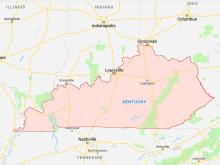
Courts have generally rejected challenges to “See You at the Pole” events, in which students who want to pray gather at their school’s flagpole outside of class time. And the Supreme Court has generally upheld student-led prayer as long as it is not compulsory or organized by school officials.

The June 28-July 1 event he calls “a bit of a vacation in a spiritual atmosphere” drew 90,000 when it was last held in 2015 — a predominantly black crowd that also included whites, Hispanics, and people from 40 other countries.
Jakes, an author, media producer, and pastor of The Potter’s House talked to Religion News Service about bridging racial and political divides, coping with terrorist threats, and his approaching 60th birthday.
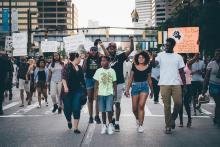
Bills criminalizing peaceful protest have been introduced to state legislatures in five U.S. states, reports The Intercept. The five states are Iowa, Michigan, Minnesota, North Dakota, and Washington. The bills have been proposed by Republican lawmakers.
The bills proposed in Iowa, Minnesota, and North Dakota aim to effect highway protests. The bill introduced in North Dakota, if passed, would give motorists the legal right to kill with their vehicles any protesters standing in the road, if the protester is struck accidentally.
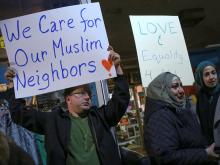
The American Civil Liberties Union collected more than $11 million and 150,000 new members. The Southern Poverty Law Center’s Twitter account gained 9,000 followers. And the Anti-Defamation League, which fights anti-Semitism and other bigotries, saw donations increase fiftyfold.
In the days since Donald Trump won the presidency, these spikes, in support for groups that defend religious and other minorities, speak to a fear that the president-elect will trample on their rights — or at least empower those who would.
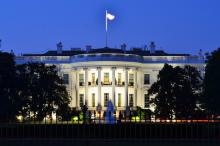
Newly released documents from the Department of Justice reveal that despite calling itself the most transparent administration in history, the Obama administration worked behind the scenes to block bipartisan transparency reform. The documents, themselves obtained by a Freedom of Information Act request, show that the administration intervened to sink legislation that would make it easier for the public to access information through FOIA.

IF YOU'VE been following Sojourners’ work for the past few years, you know that we have been deeply involved in efforts to reform our nation’s broken immigration system. In the wake of President Obama’s game-changing executive actions in November and the political firestorm they ignited, it’s appropriate for us to reflect on how we got to where we are today and where we might go from here.
After the 2012 elections, it seemed all but certain that we would see comprehensive immigration reform become law during the 113th Congress. The electorate in 2012 had a higher percentage of Latino voters than ever before, in keeping with our country’s changing demographics. The mandate seemed clear for political leaders on both sides of the aisle to prioritize immigration reform or risk alienating a constituency vital to winning future elections.
Beyond this narrow political calculus, however, many of us became deeply involved in the struggle for immigration reform because we strongly believe that fixing our broken immigration system is a moral imperative, and long overdue. Our faith as Christians compels us to struggle for a more humane immigration system. Indeed, the scriptures could not be clearer. In the Old Testament, the Lord commands: “Also you shall not oppress a stranger, for you know the heart of a stranger, because you were strangers in the land of Egypt” (Exodus 23:9).

Austria’s Muslim community is incensed over the government’s plans to amend the country’s century-old law on Islam.
The new bill, championed by Minister for Foreign Affairs and Integration Sebastian Kurz, forbids foreign funding of mosque construction or of imams working in the country and requires a unified German-language translation of the Quran.
The government argues the legislation, which Parliament will vote on this month, will help combat Islamic radicalism. Muslim groups and civic activists say it flouts the principle of equality.
“There is a general tone of mistrust toward Muslims,” said Carla Amina Baghajati, a prominent Muslim rights activist and spokeswoman for the country’s Islamic Religious Authority, referring to the bill. “The 1912 Islam law has set up a model of how state acknowledgment of a religious minority can help this minority better integrate. Muslims in Austria are proud of this law.”
| The Daily Show With Jon Stewart | Mon - Thurs 11p / 10c | |||
| Mexed Out | ||||
| ||||
How ironic that for all the protests going on about unemployment these days that a parallel debate is occurring in our agricultural sector: What to do about a shortage of workers to pick crops or care for livestock on U.S. farms.
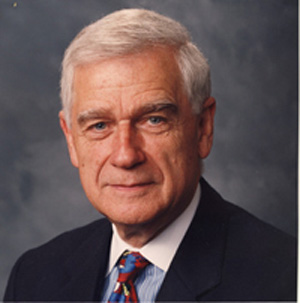 Mark O. Hatfield's political witness shaped a whole generation of students, teachers, pastors, and social activists in the evangelical community and beyond. The voice of Christians today who plead for social justice and peaceful alternatives to war would not have emerged with its strength and clarity in the 1970s without his leadership. His death underscores the vacuum of such spiritually rooted voices uncompromising in their commitments to peace and justice within the cacophony political rhetoric today.
Mark O. Hatfield's political witness shaped a whole generation of students, teachers, pastors, and social activists in the evangelical community and beyond. The voice of Christians today who plead for social justice and peaceful alternatives to war would not have emerged with its strength and clarity in the 1970s without his leadership. His death underscores the vacuum of such spiritually rooted voices uncompromising in their commitments to peace and justice within the cacophony political rhetoric today.
One of my life's greatest privileges and joys was to work as an assistant to Senator Mark O. Hatfield for nearly a decade, from 1968 to 1977. I saw first-hand what courageous leadership, combined with unswerving compassion and civility, looked like within the political life of that turbulent and formative era. Those experiences are shared in my book, Unexpected Destinations (Eerdmans).
On May 30, 2009, a terrorist attack in Arizona ended the lives of two U.S. citizens -- a Latino man and his 9-year-old daughter.
The House acted last night with boldness and leadership to pass the DREAM Act.